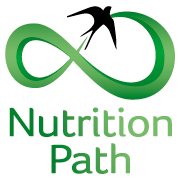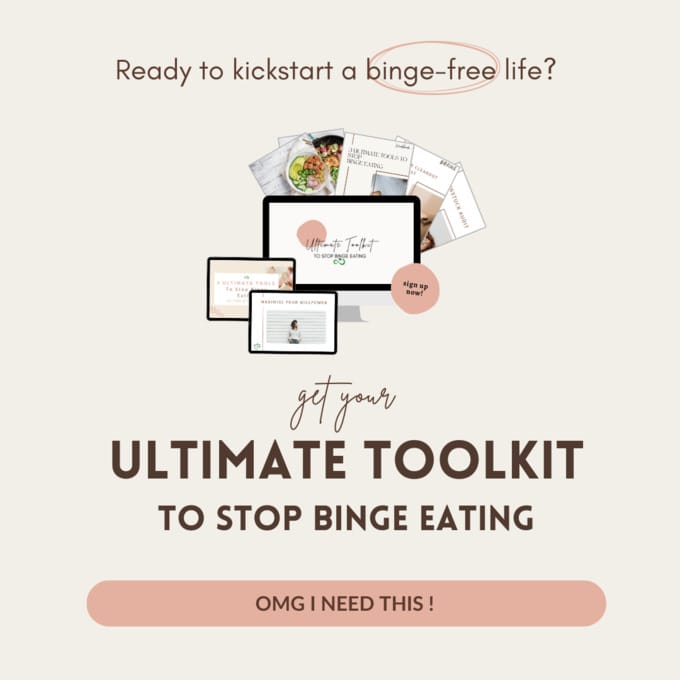Struggling with a difficult relationship with food and poor body image? Wished you could just be ‘normal’ around food? If that sounds like you and you feel like it’s time to get professional help, let’s find out if it’s an eating disorder or disordered eating patterns.
It’s easy to confuse some disordered eating patterns to an actual eating disorder. The differences include how severe the symptoms are, the duration and frequency of the behaviours. Also, how much it’s affecting your life and mental health.
Many of the clients in my Nutritional Therapy Clinic still struggle to make the first step and seek help. And that’s likely due to the stigma that still surrounds eating issues. My clients often say “I didn’t think I’m “sick” enough” before starting sessions. Although, they may be struggling around food and with their bodies every single day.
This article may help you figure out if you may have an eating disorder or whether you have some disordered eating patterns present. Also, whether getting support from a qualified professional may be a good idea for you.
Disclaimer: this post is of informative nature, however, the information provided does not substitute professional medical advice. Please contact your health provider for further information.
Eating disorder vs. disordered eating: The Statistics
At first, it may not be crystal clear why so many people have a ‘bad’ relationship with food. But ONE look at the conversations of your family, friends and co-workers (especially after the festive season) and all becomes much clearer. You may be hearing all about the new “miracle” diet Annie at work will be trying or hear your mum complain how “naughty” she’s been and eaten all the chocolates left over from the New Years party.
Messages from diet culture have a way to sieve into our environment and out subconscious. Dieting messages can feel so “normal”, because everyone is talking about it. And it can become difficult to know what’s ‘right’ and ‘wrong’ when it comes to food.
This is also why disordered eating patterns can feel like a ‘normal’ relationships with food because so many people around do not have a healthy relationship with food.
The National Eating Disorders Association states that 20 million women and 10 million men in the United States alone will suffer from an eating disorder at some point in their lives. While the National Association of Anorexia Nervosa and Associated Disorders (ANAD) reported that 30 million people in America have an abnormal relationship with food. Which is double the amount of people who actually have a diagnosed eating disorder.
Additionally, The National Eating Disorders Association found that 35% of dieting becomes obsessive, and 20 to 25% of those diets turn into eating disorders. This highlights how dieting and food obsession can turn into full-blown eating disorder behaviors.
Interestingly, disordered eating behaviours also tend to be more than twice as prevalent among females (3.8%) than males (1.5%).
Eating disorder vs. disordered eating: what’s common?
Eating disorder and disordered eating patterns can be similar in some ways. This includes fixation on food/or body shape, distorted body image, low self-esteem, and a fear of gaining weight or becoming fat.
Both eating disorders and disordered eating can involve behaviours that control food, from restricting to overeating. Both are linked with understanding of food that isn’t healthy and concerns of body image. But there are also differences between the two.
Eating disorder vs. disordered eating: Know the difference
Disordered eating is an umbrella term to describe unhealthy relationship with food and food habits. This can include anything from skipping meals, binging, purging and obsessively trying to lose weight. The difference between diagnosed eating disorder vs. disordered eating is in the severity of symptoms.
It is very normal to have too little or too much to eat sometimes. Or try to loose weight some times in different life stages. But it’s when the obsession and over-fixation comes into these behaviours that it becomes to affect our lives and mental health negatively. Perhaps it even starts to affect our relationships, health, work. That may just be a sign to finally get help with food relationship.
Eating Disorder Types
It’s difficult to know the exact rates of eating disorders. A 2017 study of over 5,700 people in Australia found that anorexia accounted for 8% of cases, avoidant/restrictive food intake disorder (ARFID) 5%, binge eating disorder 22%, bulimia 19%, and other specified feeding or eating disorder (OSFED) 47%.
The Diagnostic and Statistical Manual of Mental Disorders, Fifth Edition (DSM-V), is a tool that mental health professionals use to diagnose mental illnesses. This also includes eating disorder diagnosis. According to the DSM-V, there are several distinct types of eating disorders, each with its own set of criteria.
Anorexia Nervosa
Anorexia Nervosa is characterized by an intense fear of weight gain or becoming fat. And that can lead to severe restriction and deprivation of food. Individuals with Anorexia Nervosa often have a distorted body image, seeing themselves as overweight, while actually being underweight.
Food is deprived on a much bigger scale than what is actually needed by the body. And over time it leads to much lower body weight. Level of severity measured by BMI, 17 defined as mild, < 15 defined as severe. The DSM-V criteria mentions these behaviours for anorexia nervosa diagnosis, together with not being able to recognise the seriousness of the situation.
Bulimia Nervosa
In Bulimia Nervosa, people experience repeating episodes of binge eating, usually triggered by intense negative emotions. This is followed by compensatory behaviours such as self-induced vomiting, excessive exercise, or misuse of laxatives. And it comes with a sense of being totally out of control during the episode. By the DSM-V criteria, these episodes have to happen at least once a week for three months for a diagnosis of Bulimia Nervosa.
The struggles of people with bulimia and binge eating may not always be recognised in time, especially if only the weight changes are noticed. In my Nutritional therapy clinic I have worked with a few people, who struggled with bulimia for over 30-40 years and their family did not know about it.

Binge Eating Disorder
Binge eating disorder is recognised by episodes of eating large amounts of food in very short spaces of time. Often that leads to discomfort and intense feelings of loosing control, guilt, and distress about what has just happened. Different to Bulimia Nervosa, there is often no compensation that follows binge eating. Although, people who binge eat may restrict food in the following days after the binge eating episode. The DSM-5 criteria states that the binges have to occur at least once a week for three months to diagnose BED.
Once again, BED may not be as easy to recognise if only weight changes are noticed. Since diet talk is common in the society, BED can often go unnoticed not only be people around the person struggling, but even by the person themselves. It’s not uncommon for me to see clients, who have had BED for decades until they realised it’s a much bigger problem than just a few diets. In fact, when I ask people with BED how long has this or food been an issue, a common reply I get is “As long as I can remember”.
Orthorexia Nervosa
Orthorexia Nervosa is an unhealthy obsession with eating healthy and “clean”, or the avoidance of foods perceived to be unhealthy. Self-imposed food rules are exaggerated by fear of disease, a sense of impurity and/ or anxiety and shame.
In addition, these dietary restrictions escalate over time and may include eliminating entire food groups and doing cleanses, fasts and detoxes.
With Orthorexia Nervosa, positive body image, self-worth and identity heavily depend on the ability to stick to self-defined “healthy” behaviours. Individuals become obsessed with healthy eating to the point of psychological and physical harm.
OSFED (Other Specified Feeding or Eating Disorder)
Finally, OSFED is an entire subcategory of eating disorders that do not fit into the DSM-V criteria for other eating disorders. A range of symptoms can be included under OSFED, such as binge eating and compensation or extreme restriction. It may also come alongside purging or/and intense fear of weight gain.
OSFED can include Atypical Anorexia Nervosa, Purging disorder, Night Eating Syndrome, Compulsive Exercise and Diabulimia.

Get more information and support locally and read more about specifics of EDs:
BEAT (UK)
NEDA (USA)
NEDIC (CA)
NEDC (AUS)
Signs of Disordered Eating Patterns
Each person may show different signs of disordered eating. Often it can also be difficult to recognise. No wonder, as behaviours can be linked to dieting, low self-esteem, which is generally common. Some common disordered eating signs may include:
- Preoccupation with food, body weight or shape
- Routinely overeating and binge eating, extremely restrictive eating habits, fasting or eliminating entire food groups
- Feeling guilty, ashamed, embarrassed or anxious about eating
- Thinking about food 24/7
- Distorted body image
- Patterns of yo-yo Dieting
- Using strict Food Rules
- Excessive exercise or physical activity to “burn off” the calories eaten
- Using diet pills, supplements, laxatives or diuretics to control weight.
Ticked off a couple or quite a few signs from the list and feel like they are really affecting your life? Then it’s a really good idea to find the right person/ people to help you create a healthier relationship with food. A qualified eating disorders nutritionist or an eating disorder recovery coach can help you with most issues around food. Also, they can help you create a much healthier relationship with food you’re happy with.
When to seek help with your eating habits
Looking through the list of eating disorders, it’s clear that relationship with food is skewed. And there’s plenty of negative issues on health and the quality of daily life and wellbeing that come with it. Too often, people around may not even know the person is struggling.
Recognise yourself in any of the eating disorder descriptions? If so, it’s a good idea to find the right support for you as soon as you possibly can, even if it feels terrifying. Your family doctor/ GP should be able to direct you if you’re just not sure where to start.
In some cases and stages of an eating disorder, inpatient treatment is necessary and recommended. Additionally, working with a registered dietician can be required, depending on your personal history and situation of the eating disorder.
If you do not qualify or need inpatient treatment or help from government health agencies isn’t available, you may want to seek private help. This could be from an eating disorders nutritionist, counsellor or an eating disorder recovery coach. These professionals can be great guidance and support you need to begin your recovery journey.
You may not have a diagnosed eating disorder. However, the difficult relationship with food may be affecting your mental health and quality of life every single day.
Everyone’s experience is unique, so don’t think twice about getting the help. Especially if you’re struggling with food and your body daily. An experienced and specialised professional can help you promote a healthier relationship with food.

How Eating Disorders Nutritionist can help
There is no single answer to where to turn for help. There are so many therapists and professionals available out there that can support you in your journey. Just make sure you find a person who specialises in eating disorders and disordered eating patterns and has relevant qualifications to support you.
Most people with eating disorders and disordered eating patterns will work with a counsellor/ psychotherapist. These professionals can help with uncovering some patterns from the past that can often be challenging and help you with solutions and actions to move forward. This is extremely useful if you feel stuck in behavioural patterns and are struggling to figure out why it is happening.
Consider working with an Eating Disorders Nutritionist
They can help you change your relationship with food and help you progress with practical, actionable steps.
Work with a trained and registered Nutritional Therapist, Nutritionist or Registered Dietician. But make sure that know about the concepts of intuitive and mindful eating.
Additionally, Group Eating Disorder support sessions can be beneficial for you. Especially if you thrive with social support and a strong social network, this can help you make considerable progress.
Use all the resources you possibly can and a variety of services if that’s available for you, as that means that you tackle the issue quicker and from all the angles possible.
Should you consider working with an Eating Disorder Recovery Coach?
Working closely with an Eating Disorders Recovery Coach, you can gain insight into how to change your relationship with food while also addressing underlying mental health issues. They will work with you to build self-awareness and provide strategies to handle difficult situations through nutrition counseling.
An eating Disorder Recovery Coach often is a person, who has a foundational background in talking therapies. This can include counselling, psychotherapy, nutritional therapy or dietetics and has completed specialist training area in eating disorders.
However, just like with any professional, make sure that your chosen Eating Disorder Recovery Coach has the relevant qualifications to work with eating disorders and disordered eating habits and is not basing their work on their own recovery process alone. Try and avoid professionals, who are not eating disorder specialists or have never worked with clients with similar issues to yours before.
Have a read on their website, see if they have testimonials that you can relate to. Additionally, have the first session or introductory call to figure out if you can connect with the person and see yourself working with them.
Eating disorder vs. disordered eating: The Bottom Line
There’s definitely no ‘right’ or ‘wrong’ time to start changing your food relationship. And even if it feels like you’re not “sick enough”, but struggle everyday, it’s worth reaching out to a professional. So if you’ve been struggling with food, your body and you want out, but are scared to take the first step, remember, that it could be holding you back from living your best life.
Get help from an experienced and specialised Eating Disorders Nutritionist/ Dietician. Alongside, also work with a Counsellor/ Psychotherapist or Eating Disorder Recovery Coach. The combination of two types of therapies can help you reach food freedom quicker and show you a faster way.
Trust me, you will be pleased you did it now, rather than waited!
FAQ About Eating disorder vs. Disordered eating
- What is the difference between an eating disorder and disordered eating?
Disordered eating can be chaotic and unhealthy food habits and food relationship. An eating disorder is a diagnosed mental health illness using DSM-V criteria. - How to recognise an eating disorder versus disordered eating patterns?
An eating disorder, such as anorexia nervosa, bulimia nervosa, binge eating disorder and others fall under the DSM-V diagnosis categories. While disordered eating are unhealthy irregular eating patterns that do not fall under the diagnosis. - What are the common types of eating disorders?
Anorexia nervosa, bulimia nervosa, binge eating disorder (BED), orthorexia nervosa and OSFED are some of the main types of eating disorders by DSM-V diagnostic criteria. - Can disordered eating lead to an eating disorder?
Absolutely! Disordered eating patterns usually come before a diagnosed eating disorder. If the patterns are not dealt with, they can often intensify and evolve to an eating disorder. - How can I seek help for disordered eating or a potential eating disorder?
Start with reaching out to your family doctor or GP, as they can direct you. Also, consider private help from both the psychological and nutritional perspective.
References
https://anad.org/eating-disorder-statistic/
https://pmc.ncbi.nlm.nih.gov/articles/PMC9971930
https://my.clevelandclinic.org/health/articles/24291-diagnostic-and-statistical-manual-dsm-5
https://www.eatingdisorderhope.com/information/eating-disorder/statistics-demographics






2 thoughts on “Eating disorder vs. disordered eating: Get the Help You Need”